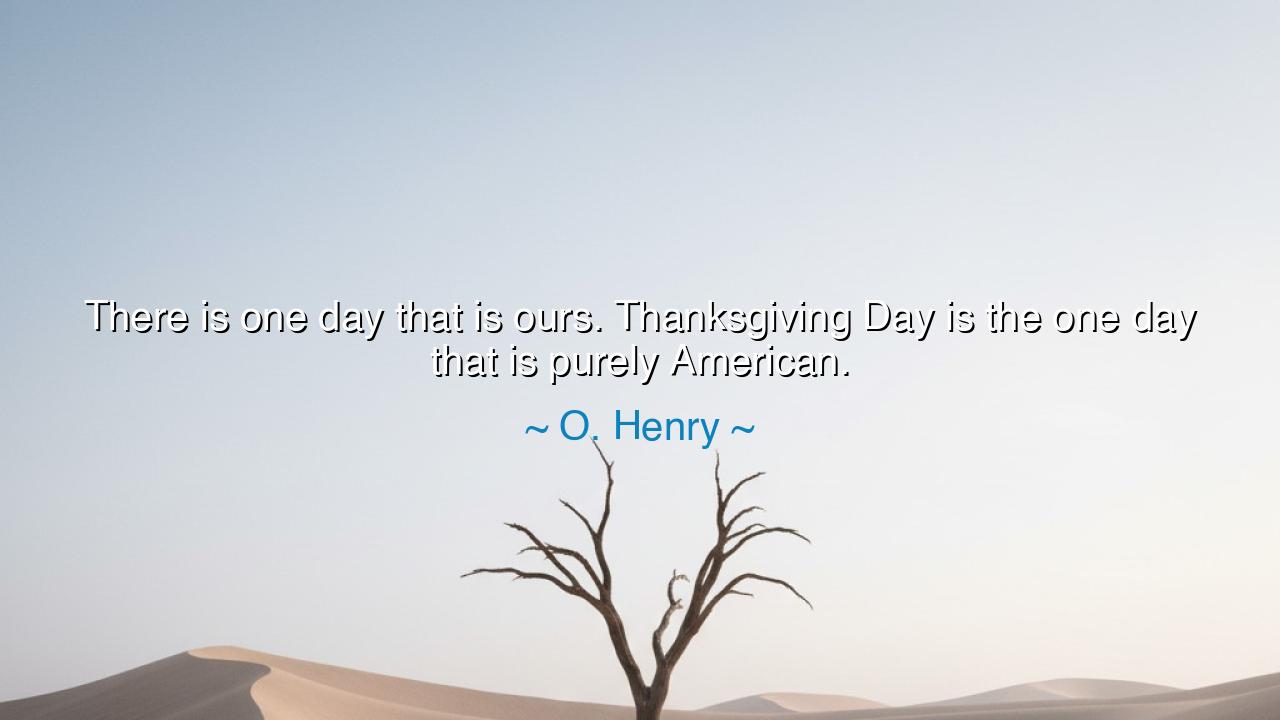
There is one day that is ours. Thanksgiving Day is the one day
There is one day that is ours. Thanksgiving Day is the one day that is purely American.






"There is one day that is ours. Thanksgiving Day is the one day that is purely American." In these stirring words, O. Henry, master of the short story and observer of human life, draws attention to the unique spirit of Thanksgiving. Unlike other feasts borrowed from ancient rituals or shared across cultures, this day grew from the soil of America itself, from its trials, its harvests, and its gratitude. In calling it "ours," he elevates Thanksgiving as a day of identity, belonging, and unity, a day when the nation pauses not to conquer, not to boast, but to give thanks together.
The origin of this truth lies in the story of the Pilgrims and the Native peoples, who joined hands in a fragile yet profound moment of fellowship. Though history is layered with conflict, the myth and memory of that shared meal endure as a symbol of gratitude born out of hardship. From that seed, the holiday grew into a national tradition, proclaimed by presidents like George Washington and Abraham Lincoln, until it became woven into the fabric of the land. Unlike Christmas, with its Christian roots, or Independence Day, with its political declarations, Thanksgiving is a feast of the people, a day of gratitude that transcends creed and background.
Consider the historical moment when Abraham Lincoln proclaimed Thanksgiving a national holiday in 1863, in the very heart of the Civil War. Brother fought against brother, and the nation seemed destined to tear itself apart. Yet Lincoln, in his wisdom, called the people to give thanks—not for abundance or peace, but for the mere blessings that remained: the fruits of the field, the endurance of the Union, the hope of healing. In that act, Thanksgiving became more than a regional custom; it became a national covenant, a reminder that gratitude must endure even in times of suffering.
O. Henry’s declaration also carries a deeper symbolic power. By naming it "purely American," he points to the unifying force of shared tradition. It is a day when immigrant and native-born, rich and poor, old and young all gather around the same table. Each family may season the feast differently, but the spirit is one: to pause, to remember, and to give thanks. In a world of divisions and competing interests, Thanksgiving stands as a reminder of common ground, a ritual that belongs to everyone and excludes no one.
There is also wisdom here about ownership. To say "ours" is to acknowledge that Thanksgiving is not the property of government or church, but of the people themselves. It belongs to the farmer who gathers his harvest, the worker who comes home weary, the child who waits eagerly for pie, the elder who remembers the struggles of past years. In this sense, Thanksgiving is democratic in its purest form—a day of the people, by the people, for the people, in which gratitude itself becomes the great equalizer.
The lesson for future generations is clear: do not let this day lose its meaning in mere indulgence or consumerism. Remember that it is not just about food, nor even just about family, but about a people united in gratitude. It is a day to pause from striving, to recognize the blessings that sustain us, and to honor the labor, sacrifice, and grace that made them possible. To call it "ours" is to claim it not passively, but actively—to preserve it, to live it, and to pass it on.
Practical action flows from this truth. On Thanksgiving, let every person give thanks not only for personal blessings, but for the gift of shared identity. Tell the stories of the past, honor the struggles of ancestors, remember those who built the harvest we now enjoy. Extend gratitude beyond the table—visit the lonely, feed the hungry, mend broken bonds. For the holiday will only remain "ours" if it is lived as a shared offering of gratitude, not as a private indulgence.
Thus O. Henry’s words ring with timeless resonance: Thanksgiving is the one day that is purely American, for it is the feast of gratitude that binds a people together. It is the inheritance of a nation, born of hardship, sustained by tradition, and preserved by the spirit of unity. Teach this truth, live this truth, and the day will remain not only ours, but a gift of hope to generations yet to come.






AAdministratorAdministrator
Welcome, honored guests. Please leave a comment, we will respond soon